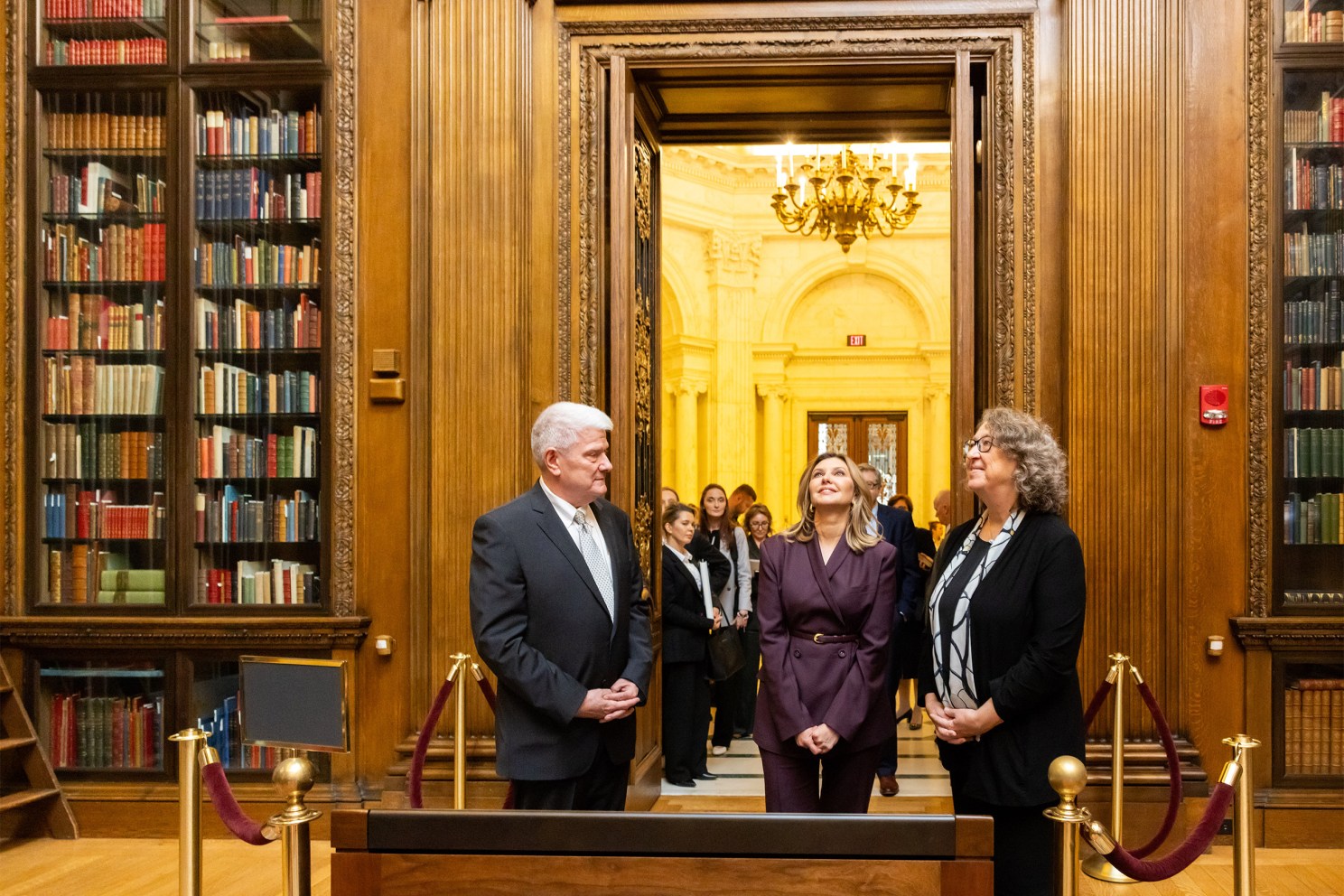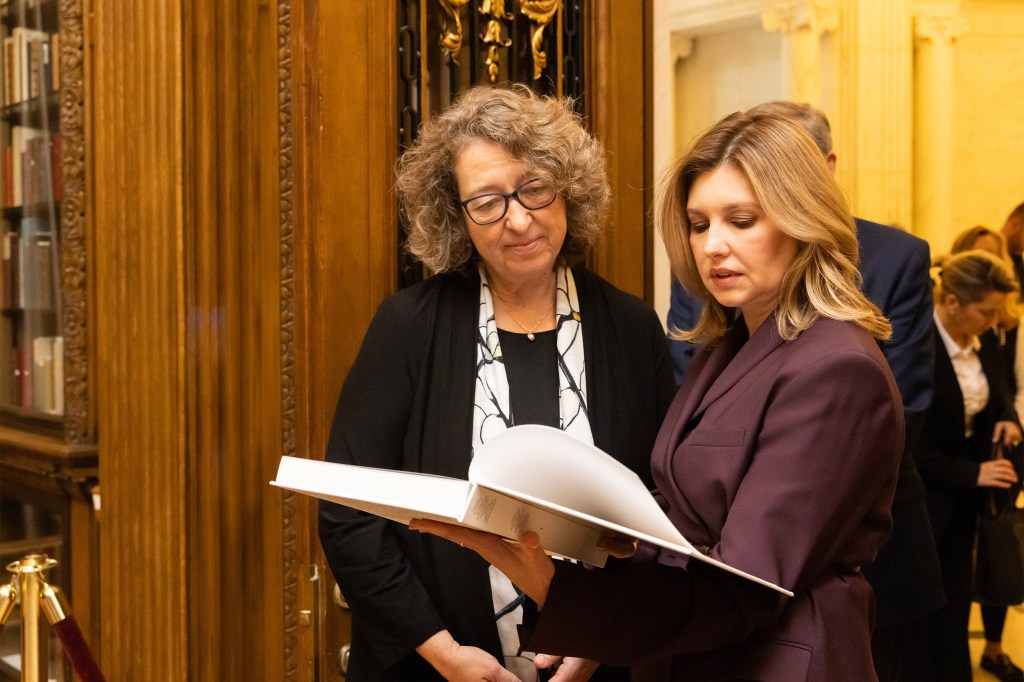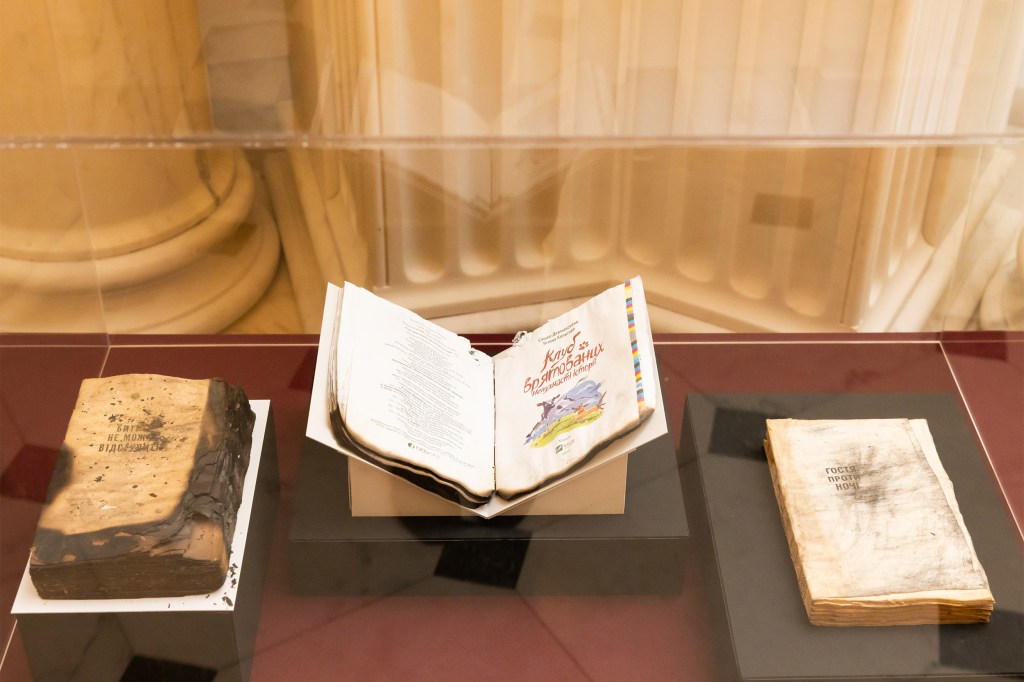
First lady of Ukraine Olena Zelenska (center) takes in the Widener Memorial Room with curator Peter X. Accardo and University Librarian Martha Whitehead.
Photos by Steph Stevens
Ukraine’s first lady shares history with Harvard
Olena Zelenska presents Harvard Library with books, shows appreciation for its contribution to Ukrainian studies
When Olha Aleksic came to Harvard as a graduate student from Ukraine, it was to study the history of Christianity at the Divinity School. During an internship in Widener Library’s Slavic division, she discovered her passion for libraries, which then led to a career in collection development and a reference librarianship working with Ukrainian materials.
Nearly 20 years later, it was Aleksic, now Harvard Library’s Ukrainian bibliographer, who greeted the first lady of Ukraine, Olena Zelenska, at the Widener. It was a key stop in Zelenska’s visit to the University, which was celebrating the 50th anniversary of the Harvard Ukrainian Research Institute.
During the Sept. 24 visit, Aleksic introduced Zelenska to Harvard Library’s Ukrainian collections, one of the largest and most comprehensive outside of Europe. Among the valuable Ukrainian items in Harvard’s collections are Ivan Fedorov’s “Apostol” and “Primer” (1574), the first books printed in Ukraine.
“The first lady specifically chose to visit Harvard Library because libraries are places where history can be preserved,” noted Aleksic.
Zelenska was officially welcomed in the Widener Rotunda by Martha Whitehead, vice president for the Harvard Library and University librarian.
“We see our collections as a vital resource for Harvard’s Ukrainian Studies programs and as a treasure trove for the distinguished visiting scholars who come to work and study at the Ukrainian Research Institute,” said Whitehead. “Our Ukrainian collections will tell the story of Ukraine and its people far into the future.”
Zelenska noted her deep appreciation for Harvard Library’s contribution to Ukrainian Studies, presenting Whitehead with “Ukraine and Ukrainians,” an art book by Ivan Honchar, to add to Harvard’s collection.


“This is a very important volume that provides in-depth information about Ukraine and Ukrainians. We’re so pleased to gift it to Harvard Library,” Zelenska said.
Accepting the books on behalf of the library, Whitehead emphasized its longstanding commitment to its global collections and expanding world knowledge.
“We collect and preserve global voices for present and future generations of scholars,” she said. “Our collections are a vital resource for Harvard’s Ukrainian Studies programs, and we want the full range of Ukrainian thought and experience to be represented here.”
Zelenska also gave Harvard Library three war-damaged books: a children’s book by Oleksandr (Sashko) Dermanskyi; a novel translated from English to Ukrainian by Heather Gudenkauf; and an autobiography by Pavlo Belianskyi. The books were rescued from a ruined warehouse of the Faktor Druk printing house in Kharkiv, which was struck by a missile in May 2024.
Conservators at Harvard Library’s Preservation Services are currently creating custom enclosures for the books to preserve and protect them against further damage. Part of Harvard Library’s mission is to preserve knowledge for the future. It has long rescued and preserved books and cultural materials from places where they are endangered.
“One of our key strategic priorities is preserving knowledge for the future,” said Whitehead. “We have a fabulous team in our Collections Care Lab who will ensure the best care of these books, and our creative librarians will find opportunities to have our users experience their impact.”
Among her other stops, Zelenska also spoke at Harvard’s Ukrainian Research Institute. To view the video, visit its website.




